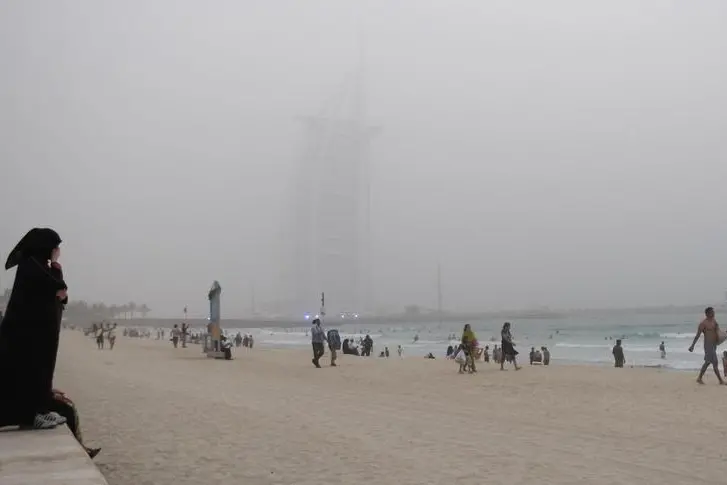PHOTO
A satellite system to monitor and forecast the air quality or dust storms three days in advance has recently been set up in the UAE. The system will help check climate-related public health issues, according to an official from the Ministry of Climate Change and Environment (MoCCAE).
This, along with a recent assessment done by the MoCCAE and the Ministry of Health and Prevention (Mohap), shows a burden of climate-related diseases including those associated with carbon pollution - such as cardiovascular and respiratory diseases - climate-related infectious diseases, malnutrition and heat stress, which leads to reduced labour productivity and spiralling health costs.
"This satellite works with an algorithm and can detect dust particles or a dust storm three days in advance," said Fatima Al Hammadi from the air quality department at the MoCCAE, while speaking to Khaleej Times.
"We see a lot of dust particles during summer, especially that affect our air quality and increases the cases of respiratory diseases such as asthma," she said, adding that the particles decrease in winter.
Fatima said that air quality was linked to health, economy and environment. "In 2017, we have achieved clean air quality levels of 77 per cent and by 2021, we aim to achieve 99 per cent," she said.
"In 2007, the UAE had 21 monitoring stations across the country. In 2018, the number increased to 41 stations. All of these measure pollutants that affect the health of people," said Fatima.
Health experts in a recent meeting concluded that the direct and indirect impacts of climate change on human health in the UAE are primarily seen in the form of heat stress. This results in reduced labour productivity, particularly for outdoor labourers and mortality or morbidity due to heat stroke.
"This assessment of climate-related health risks is the first brick in the wall to identify the current impacts of climate change on various sectors and come up with ways to adapt to these impacts. Such assessments will help us understand the bigger picture and act accordingly," said Fahed Al Hammadi, acting assistant undersecretary of the green development and climate change sector at the MoCCAE.
The recent assessment reveals the burden of climate-related diseases which should be monitored and addressed.
"These include diseases associated with carbon pollution, such as cardiovascular and respiratory diseases, climate-related infectious diseases, malnutrition and heat stress," said Dr Hussein Abdul Rahman Al Rand, assistant undersecretary for centres and health clinics at the Mohap.
However, despite existence of adaptation-related initiatives for climate risks, there is still a lot of room for more climate-focused adaptation policies and programmes.
Proposed actions include enhancing early warning systems and developing heat alert plans, especially for outdoor labourers during extreme heat, and developing the capacity of clinics and health stations to recognise and respond to labour concerns on reduced productivity due to climate-related factors.
The experts also recommended that more research needs to be undertaken on the effects of climate change on labour productivity, in addition to strengthening enforcement of existing initiatives such as the Safety in Heat and midday break programmes.
CO2 content reduced by 16% in 100 days
In a project done with the aluminium sector in Dubai, the Ministry of Climate Change and Environment (MoCCAE) reduced carbon dioxide in the air by 16 per cent in 100 days or equivalent of emissions from 450,000 cars, said Fatima Al Hammadi from the air quality department at the MoCCAE. "Imagine this is done only with one sector, what if other sectors are involved," she said.
The target was to achieve 10 per cent in 100 days and the MoCCAE brainstormed it for the Dubai Accelerator Project.
KT NANO EDIT
Better be prepared
The air pollution warning system will help asthma sufferers, the aged, young children and those with weak immunity to take precautions when they go outdoors as the weather changes. It also relieves stress on the health system if people are better prepared to deal with dusty conditions and pollution, while bringing medical costs down. Satellite technology has come a long way and is aiding people in the prevention of diseases, which is better than finding expensive cures.
Copyright © 2018 Khaleej Times. All Rights Reserved. Provided by SyndiGate Media Inc. (Syndigate.info).





















